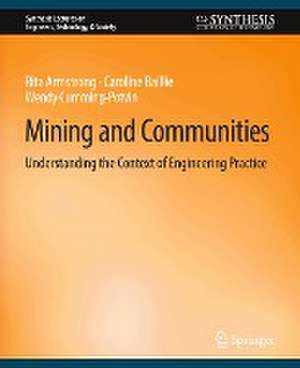Mining and Communities: Understanding the Context of Engineering Practice: Synthesis Lectures on Engineers, Technology, & Society
Autor Rita Armstrong, Caroline Baillie, Wendy Cumming-Potvinen Limba Engleză Paperback – 26 feb 2014
Din seria Synthesis Lectures on Engineers, Technology, & Society
-
 Preț: 336.85 lei
Preț: 336.85 lei -
 Preț: 264.97 lei
Preț: 264.97 lei -
 Preț: 454.53 lei
Preț: 454.53 lei -
 Preț: 207.83 lei
Preț: 207.83 lei -
 Preț: 211.08 lei
Preț: 211.08 lei -
 Preț: 206.29 lei
Preț: 206.29 lei -
 Preț: 261.91 lei
Preț: 261.91 lei -
 Preț: 208.41 lei
Preț: 208.41 lei -
 Preț: 191.31 lei
Preț: 191.31 lei -
 Preț: 351.41 lei
Preț: 351.41 lei -
 Preț: 191.31 lei
Preț: 191.31 lei -
 Preț: 191.31 lei
Preț: 191.31 lei -
 Preț: 191.31 lei
Preț: 191.31 lei -
 Preț: 191.31 lei
Preț: 191.31 lei -
 Preț: 173.13 lei
Preț: 173.13 lei -
 Preț: 211.67 lei
Preț: 211.67 lei -
 Preț: 173.13 lei
Preț: 173.13 lei -
 Preț: 191.31 lei
Preț: 191.31 lei -
 Preț: 234.87 lei
Preț: 234.87 lei -
 Preț: 173.13 lei
Preț: 173.13 lei -
 Preț: 191.31 lei
Preț: 191.31 lei -
 Preț: 298.62 lei
Preț: 298.62 lei -
 Preț: 291.69 lei
Preț: 291.69 lei - 20%
 Preț: 358.70 lei
Preț: 358.70 lei -
 Preț: 290.92 lei
Preț: 290.92 lei
Preț: 263.82 lei
Nou
Puncte Express: 396
Preț estimativ în valută:
50.50€ • 54.87$ • 42.45£
50.50€ • 54.87$ • 42.45£
Carte tipărită la comandă
Livrare economică 21 aprilie-05 mai
Preluare comenzi: 021 569.72.76
Specificații
ISBN-13: 9783031009860
ISBN-10: 303100986X
Ilustrații: XXII, 126 p.
Dimensiuni: 191 x 235 mm
Greutate: 0.27 kg
Editura: Springer International Publishing
Colecția Springer
Seria Synthesis Lectures on Engineers, Technology, & Society
Locul publicării:Cham, Switzerland
ISBN-10: 303100986X
Ilustrații: XXII, 126 p.
Dimensiuni: 191 x 235 mm
Greutate: 0.27 kg
Editura: Springer International Publishing
Colecția Springer
Seria Synthesis Lectures on Engineers, Technology, & Society
Locul publicării:Cham, Switzerland
Cuprins
Preface.- Mining in History.- The Ok Tedi Mine in Papua New Guinea.- Mining and Society in Western Australia.- Acting on Knowledge.- References.- Author Biographies .
Notă biografică
Rita Armstrong is an anthropologist with a Ph.D. from the University of Sydney, based on two year's fieldwork in a longhouse community in Central Borneo. With an undergraduate major in History, she combines historical research with anthropological methodologies and interests to analyze a variety of issues: Indigenous perceptions of social change, political economy of the interaction between shifting cultivators and the state, subjective understanding of "development" and how all these influence and shape local identity. She has worked with Caroline Baillie, an engineer and social activist, for a number of years in developing interdisciplinary teaching material for first-year engineers at the University of Western Australia, and, most recently, on research projects funded by the International Mining for Development Centre. She continues to teach in Anthropology and Engineering and this experience has underlined the importance of developing collaborative research projects across these disciplines to better understand how we can resolve the increasing inequity in peoples' capacity to deal with issues such as climate change, resource extraction, and diminishing water supply. Caroline Baillie is Chair of Engineering Education for the Faculty of Engineering, Computing and Mathematics at the University of Western Australia. Before coming to Perth, Caroline was Chair of Engineering Education Research and Development at Queens University, Kingston, Ontario, and she also held posts at Imperial College and the University of Sydney. Caroline is particularly interested in ways in which science and engineering can help to co-create solutions for the environment as well as social problems. She founded the global Engineering and Social Justice network in 2004 and applies this lens to her own technical work on low cost natural fiber composites for developing countries. Her not-for-profit organization Waste for Life works to create poverty-reducing solutions to environmental issues.Caroline is Editor of this series "Engineers, Technology and Society." Caroline Baillie is Chair of Engineering Education for the Faculty of Engineering, Computing and Mathematics at the University of Western Australia. Before coming to Perth, Caroline was Chair of Engineering Education Research and Development at Queens University, Kingston, Ontario, and she also held posts at Imperial College and the University of Sydney. Caroline is particularly interested in ways in which science and engineering can help to co-create solutions for the environment as well as social problems. She founded the global Engineering and Social Justice network in 2004 and applies this lens to her own technical work on low cost natural fiber composites for developing countries. Her not-for-profit organization Waste for Life works to create poverty-reducing solutions to environmental issues. Caroline is Editor of this series "Engineers, Technology and Society."
